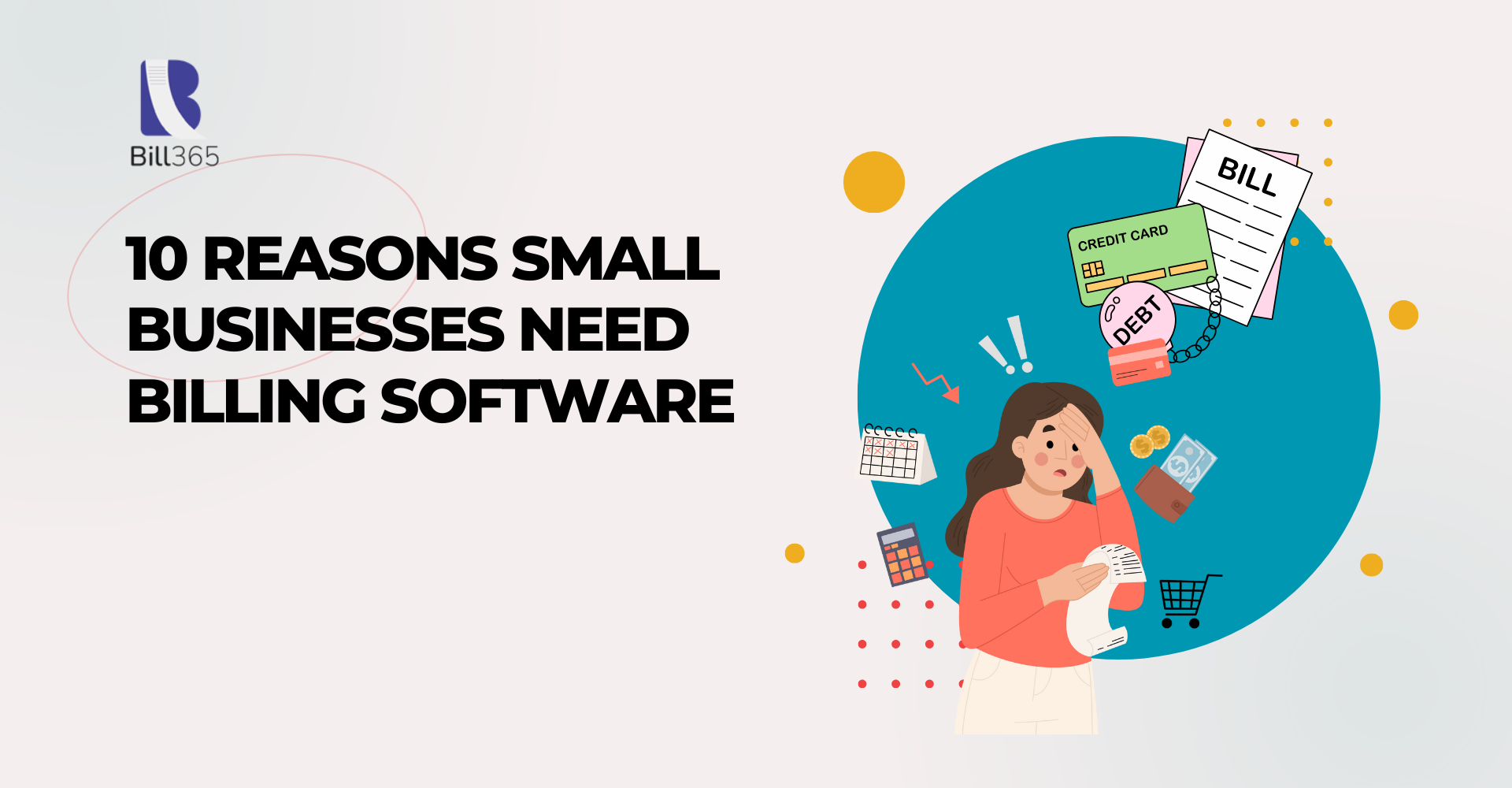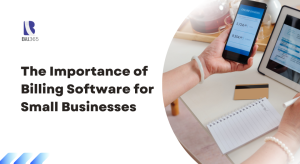
10 Reasons Small Businesses Need Billing Software
Running a small business comes with many challenges, and managing invoices is one of them. Billing software for small businesses helps owners create invoices quickly, track payments, and manage finances without errors. It saves time and makes daily operations smoother. Manual billing can lead to mistakes, delays, and missing payments, which affects cash flow.
A good billing system allows businesses to generate invoices instantly, send automated payment reminders, and keep financial records organized. It also helps with tax calculations and ensures compliance with GST regulations. Small business owners don’t have to spend hours on paperwork when billing software does the job in minutes.
Choosing the right billing tool improves accuracy and security. It stores customer details, tracks sales, and provides reports to understand business performance. Many solutions offer cloud backup, keeping financial data safe from loss or damage. Businesses can also accept multiple payment methods, making transactions easier for customers.
Investing in a billing system reduces costs in the long run. It eliminates the need for manual record-keeping and helps businesses stay on top of their finances. With the right software, small businesses can focus on growth instead of worrying about billing issues.
The Importance of Billing Software for Small Businesses

Managing invoices and payments is a key part of running a business. Billing software for small businesses makes this process easy by automating tasks and reducing errors. Handling bills manually can lead to mistakes, delayed payments, and financial confusion. A billing system ensures every transaction is recorded properly, helping businesses stay organized.
Small businesses need accurate invoicing to track earnings, expenses, and taxes. Billing software generates professional invoices in seconds, calculates taxes automatically, and keeps records safe. This helps business owners avoid late payments and tax penalties. With features like automated payment reminders, businesses can ensure customers pay on time, improving cash flow.
Keeping financial data secure is another advantage. Billing tools store information safely, reducing the risk of data loss. Many solutions offer cloud storage, making it easy to access records from anywhere. Businesses can also accept multiple payment options, giving customers a better experience.
Using billing software saves time and effort. Instead of spending hours on paperwork, business owners can focus on growth and customer service. Choosing the right tool helps businesses work smarter, keep finances under control, and run operations smoothly.
10 Key Reasons Small Businesses Need Billing Software
Handling invoices and payments is an important part of running a business. Billing software for small businesses helps owners manage these tasks efficiently, reducing errors and saving time. A reliable billing system ensures smooth financial operations, improves cash flow, and keeps business records accurate.
1. Saves Time and Reduces Manual Work
Manually creating invoices, tracking payments, and managing records take a lot of time. Billing software automates these tasks, allowing business owners to focus on growing their business. A few clicks generate professional invoices, send them to customers, and track payments without hassle.
Automation helps avoid repetitive tasks, such as writing invoice details, calculating totals, and applying taxes. Businesses don’t have to spend hours correcting mistakes or looking for missing records. Everything is stored in one place, making it easier to access past invoices.
Instant invoice generation means businesses can send bills immediately after completing a sale. This speeds up the payment cycle and ensures a steady cash flow. With automated payment reminders, customers are more likely to pay on time, reducing outstanding dues. Time saved on billing can be used for customer service, marketing, or business expansion.
2. Enhances Accuracy and Reduces Errors
Mistakes in invoices can lead to payment delays and misunderstandings with customers. Billing software ensures accurate calculations, reducing human errors in manual billing. It applies taxes correctly, calculates discounts, and prevents duplicate entries.
Keeping financial records error-free is crucial for tax compliance and business transparency. A small miscalculation can result in incorrect tax payments, leading to penalties. Automated invoicing eliminates the risk of incorrect figures, ensuring businesses meet tax requirements.
Business owners no longer need to double-check every invoice for mistakes. The software automatically formats invoices with proper itemization, prices, and taxes. Customers receive clear, professional invoices that build trust. Maintaining accuracy in financial transactions strengthens business credibility and prevents losses from incorrect billing.
3. Improves Cash Flow Management
Cash flow is the backbone of any business. Delayed or missed payments can create financial stress. Billing software helps track all transactions, ensuring businesses know what they are owed and when to expect payments.
Invoices are sent instantly, and businesses can set up automated reminders for unpaid bills. Customers receive notifications, reducing the chances of late payments. Clear payment records help businesses follow up efficiently without manual tracking.
Real-time tracking of income and expenses allows businesses to plan better. Owners can analyze payment trends, identify slow-paying customers, and take action to maintain a healthy cash flow. Knowing exactly how much money is coming in and going out prevents financial shortfalls. Businesses can make informed decisions about investments, salaries, and expenses based on their cash flow reports.
4. Helps with Tax Compliance and GST Filing
Small businesses must follow tax laws and file GST returns correctly. Billing software makes this easy by generating GST-compliant invoices with accurate tax calculations. Businesses don’t have to worry about missing tax deadlines or making errors in tax filings.
Every invoice includes the correct GST details, ensuring businesses meet government regulations. Automated tax reports simplify filing returns, reducing the workload during tax seasons. Instead of manually calculating tax amounts, the software applies the right tax rates to each transaction.
Maintaining proper tax records prevents financial penalties. Business owners can access detailed reports anytime, helping them stay prepared for audits or tax assessments. Compliance becomes effortless when all financial data is systematically recorded and updated in real time.
5. Increases Security and Data Protection
Financial data is one of the most valuable assets of a business. Losing invoice records or exposing them to unauthorized access can cause serious problems. Billing software stores all financial data securely, preventing data loss and unauthorized access.
Cloud-based billing solutions offer additional security by keeping data backed up online. Businesses can access their invoices and payment records from any location without worrying about losing information due to system failures or accidental deletions.
Role-based access ensures that only authorized employees can view or edit financial records. This protects business data from internal fraud or mishandling. Strong encryption and secure login features add another layer of security, ensuring sensitive financial information stays protected.
6. Enhances Customer Experience
Professional invoices create a positive impression on customers. Billing software allows businesses to send well-designed, easy-to-understand invoices that include clear payment details and due dates. This reduces confusion and speeds up payments.
Multiple payment options, such as credit cards, UPI, and bank transfers, make it convenient for customers to pay. A seamless billing experience encourages repeat business and strengthens customer relationships.
Customers also benefit from automated reminders about upcoming payments. They don’t have to keep track of due dates manually, reducing the chances of late payments. Quick access to past invoices and transaction history improves transparency, ensuring customers feel confident about doing business.
7. Provides Real-Time Business Insights
Understanding business performance is essential for growth. Billing software offers real-time reports on sales, outstanding invoices, and overall revenue. These insights help business owners make informed decisions and identify areas that need improvement.
Detailed financial reports help track profit margins, monitor customer payment trends, and analyze product sales. Instead of guessing how the business is performing, owners get clear data that supports strategic planning.
Identifying slow-paying customers or frequently returned products helps in adjusting sales strategies. Forecasting future revenue becomes easier when financial trends are available at a glance. Strong reporting tools give businesses a competitive advantage by helping them plan effectively.
8. Scalability for Business Growth
Small businesses aim to expand, and managing a growing number of transactions manually becomes difficult. Billing software scales with the business, handling increasing invoices, customers, and payments efficiently.
Adding new products, services, or branches doesn’t require a complete overhaul of the billing process. The software adapts, allowing businesses to manage multiple locations and accounts from a single platform.
A scalable billing system supports long-term business growth without requiring additional administrative efforts. It ensures businesses remain organized and efficient, no matter how big they grow.
9. Cost-Effective Solution for Small Businesses
Hiring an accountant or managing manual billing takes up resources. Billing software reduces these costs by automating financial tasks and eliminating the need for additional staff. Businesses save money while maintaining accurate and professional invoicing.
Errors in manual billing can lead to financial losses. Overpayments, underpayments, or tax miscalculations affect the bottom line. Automated invoicing minimizes such risks, helping businesses keep their finances stable.
Cloud-based billing solutions offer affordable subscription plans, making them accessible to small businesses. The cost of software is much lower than hiring a full-time accountant, making it a smart investment.
10. Compliance with Legal and Financial Regulations
Government regulations require businesses to maintain proper financial records. Failing to meet these requirements can result in fines or legal issues. Billing software ensures that invoices, tax reports, and payment records are well-documented and easily accessible.
Having clear and accurate records simplifies audits and reduces legal risks. Businesses can generate reports quickly, providing proof of transactions whenever required. Compliance becomes stress-free when everything is systematically recorded.
Tax laws often change, and billing software updates automatically to reflect new regulations. Businesses don’t have to manually adjust tax calculations or worry about outdated billing formats. This ensures that all invoices meet the latest legal standards.
Conclusion
Billing software is essential for small businesses looking to streamline invoicing, improve accuracy, and ensure smooth financial operations. It saves time, enhances security, and provides valuable insights for better decision-making. Investing in the right billing tool helps businesses focus on growth, manage cash flow effectively, and maintain compliance with tax regulations. A simple and efficient billing system makes financial management stress-free and supports long-term success.
